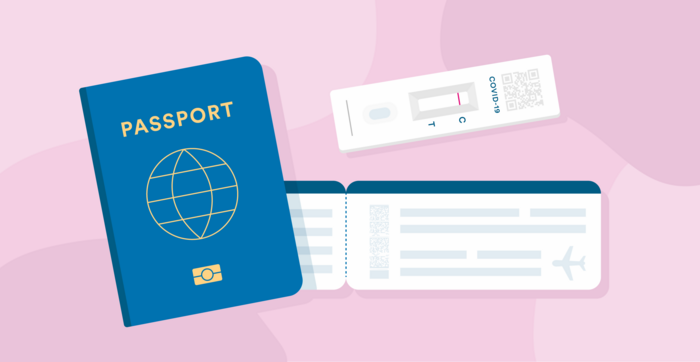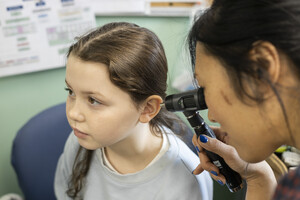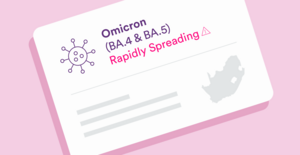Key points
- Research your destination’s health requirements through the CDC and State Department.
- If international trips, schedule a pre-travel health consultation at least 4–6 weeks before departure.
- Stay up to date on routine and destination-specific vaccinations.
- Prepare a travel health kit with essentials and prescriptions.
- Know what to do and where to go if you get sick while abroad.

Whether you’re headed across the country or halfway around the world, preparing for a trip now involves more than just packing a suitcase and booking your flight. Staying healthy while traveling—especially internationally—means doing your homework ahead of time. Understanding the health risks at your destination, making sure you’re up to date on vaccines, and knowing what to do if you get sick abroad are just a few of the steps to take before you go.
Smart travel preparation starts weeks in advance. Here’s what you should know about protecting your health when traveling domestically or internationally.
Research your destination’s health guidelines
Different countries and even regions within countries have varying health requirements and recommendations. Some may require proof of certain vaccinations, while others may issue travel advisories related to disease outbreaks, air quality, or natural disasters.
Before your trip, visit the CDC’s travel health website or the U.S. Department of State’s country information pages to review the latest guidance. This may include:
• Required or recommended vaccines
• Health risks like mosquito-borne illnesses
• COVID-19 updates or other infectious disease alerts
• Medication availability or restrictions
Schedule a pre-travel health consultation
The CDC recommends visiting a travel medicine specialist or your healthcare provider at least 4 to 6 weeks before traveling internationally. This pre-travel consultation can help you:
• Understand health risks specific to your destination
• Receive necessary vaccinations or boosters
• Discuss travel prescriptions, such as antimalarial drugs
• Get tips on food and water safety
• Address special concerns (e.g., traveling with children, chronic illness, or pregnancy)
You can find travel clinics through the CDC’s Traveler’s Health portal or by asking your primary care provider for recommendations.
Make sure you’re up to date on vaccines
Routine vaccinations are essential for travel and include protection against measles, mumps, rubella (MMR), tetanus, flu, COVID-19, and more. Depending on your destination, you may also need additional vaccines such as:
• Yellow fever: Required for entry into certain countries in Africa and South America.
• Typhoid: Common in parts of Asia, Africa, and Latin America.
• Hepatitis A and B: Transmitted through food, water, and bodily fluids.
• Rabies: Recommended for travelers spending extended time outdoors or in rural areas.
• Japanese encephalitis or cholera: Based on destination and length of stay.
Your healthcare provider can help determine which vaccines you may need.
Prepare for travel with children or older adults
Children, seniors, and travelers with chronic health conditions may need additional precautions. For example:
• Children may need updated vaccine schedules or additional protection based on age.
• Older adults may be more vulnerable to complications from illnesses like flu, pneumonia, or COVID-19.
• Individuals with compromised immune systems should consult a specialist to minimize risk.
The CDC offers detailed resources to help families prepare for international travel, including tips on medications, jet lag, and sun safety.
Pack a travel health kit
A well-stocked travel health kit can help you stay prepared in case of illness or injury. Your kit should include:
• Prescription medications (in original containers)
• Over-the-counter remedies for pain, nausea, allergies, and diarrhea
• Hand sanitizer and disinfecting wipes
• First-aid items like bandages and ointments
• Insect repellent and sunscreen
• Copies of prescriptions and your vaccination record
If you’re traveling with children, include age-appropriate medications and supplies.
Know what to do if you get sick abroad
Getting sick away from home can be stressful. Before you go, identify reputable hospitals or clinics in your destination and verify your health insurance coverage for international travel. You may want to consider travel health insurance or medical evacuation coverage if you’re visiting a remote location.
If you develop symptoms after returning home—such as fever, diarrhea, rash, or fatigue—see your doctor promptly and mention your recent travel. According to the CDC, early diagnosis is key to treating illnesses like malaria, dengue, and other tropical infections.
What about COVID-19?
While COVID-19 is no longer the global disruptor it once was, it remains a concern—especially in crowded travel settings like airports and public transit. Some countries may still require vaccination or testing for entry.
Best practices include:
• Staying up to date on COVID-19 boosters
• Masking in high-risk areas if you’re immunocompromised
• Carrying test kits and antiviral medication if advised by your doctor
Check your destination’s current COVID-19 policies before your trip.
FAQs
Do I need to get any vaccines before I travel internationally?
Yes. The vaccines you need depend on where you’re going and your health history. Check the CDC’s destination pages or visit a travel clinic for personalized recommendations.
How far in advance should I see a doctor before my trip?
Aim to schedule a pre-travel visit at least 4 to 6 weeks before your departure. This allows time for any required vaccines and medications to take effect.
Should I still worry about COVID-19 when I travel?
COVID-19 is still circulating globally. While most travel restrictions have eased, some countries may require proof of vaccination. It’s wise to stay current on boosters and practice good hygiene while traveling.
What should be in a travel health kit?
Include any prescription medications, over-the-counter remedies, first-aid supplies, hand sanitizer, sunscreen, and copies of your health records.
Where can I get help if I get sick while abroad?
Check with your travel insurance provider for in-network hospitals. The U.S. embassy can also help you locate medical care in many countries. If you feel unwell after returning home, see your doctor and share your travel history.









